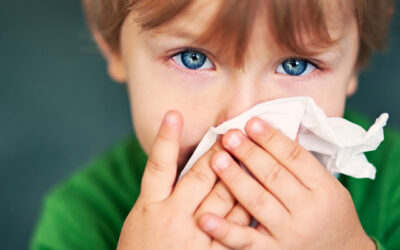The tween and teen years aren’t all rocky. Deepening relationships with our children as they come into themselves as young adults is one of the many blessings of parenting.
Parents modeling healthy behavior as adults is the overarching theme of this ParentingU episode with returning guest Reuben Battley, MD, adolescent medicine specialist with Our Lady of the Lake Children’s Health. Dr. Battley shares about his work caring for patients ages 12-21 treating a variety of concerns from menstrual problems to stress, anxiety, depression and ADHD, and covers the gamut of teen issues, offering advice to support parents helping their tweens and teens successfully navigate their launch to adulthood.
Tweens, Teens and Self-Esteem
The process of building self-esteem starts in the younger years, with parents helping their children navigate problems and conflicts, owning their own solutions and finding tools to feel confident in themselves and their abilities.
In the tween and teen years, self-esteem becomes even more important in their day-to-day lives.
“A lack of self-esteem can really drive a lot of negative behaviors,” Dr. Battley says. Having strong self-esteem can help teens avoid negative impacts of peer pressure and be better decision makers.
He encourages his own daughter to focus on the part of self-esteem that comes from inside and what she thinks more than others’ opinions.
“It really doesn’t matter what anyone thinks, and I continue to reiterate that what you think of yourself is the most important,” Dr. Battley says.
Fostering Healthy Communication
Teens and parents being in conflict may be a traditional storytelling trope of movies and TV shows, but it’s also something we all experience and work through.
Straightforward, simple conflict disagreements can be the perfect way to model healthy communication.
“Respond in a non-condescending tone without raising your voice, be patient and allow dialogue back and forth,” Dr. Battley advises. Healthy conversations with your teen include honoring their opinion even when you don’t agree.
Because our ultimate parenting goal is for our teens to make healthy decisions and be successful adults, we have to help them work through that. It doesn’t just happen on their 18th birthday.
Navigating Friendships
Relationships evolve throughout adolescence as teens explore different interests and groups of friends. Helping kids know how to find good friends and how to be a good friend is an important part of parenting. Dr. Battley says modeling is the answer.
“What you show them as an adult by modeling good friendships and showing them good relationships will teach them what a good friend is,” Dr. Battley says.
The fickle nature of feelings is also something kids need to learn, not only how others feel about them but also their own feelings about their friends.
“Don’t put all your stock and emotions into relationships that change day-to-day or minute-to-minute,” Dr Battley says. Someone who is your best friend now may become a less important part of your life later.
Dealing with toxic friends is a learned skill, and parents can support their teens when faced with such a situation, but sometimes the hardest part is helping your teen identify the friendship or relationships that should change or go away.
Dr. Battley says that all starts early, well before the teen years, by creating a culture of communication and openness as a family. Then you can help your teen understand and own their solution.
“The goal is to allow them to make their own decisions so that they can make healthy decisions as they get older,” Dr. Battley says.
Guiding Teens in the Dating World
Modeling healthy romantic relationships is Dr. Battley’s best advice for parents to set up their teens for success in dating.
“Show teens how humans and healthy relationships should interact and how they should treat each other,” he says. “Kids learn way more from what you do than what you say.” Engaging or tolerating negative relationships in front of a child will normalize that and they can carry it into their own romantic relationships.
Reinforcing how teens should be treated in relationships can build self-confidence.
“Teens with high self-esteem would recognize situations that aren’t healthy for them and would remove themselves from them,” Dr. Battley says.
Handling Big Emotions
Big emotions are a hallmark of the teen years, and since the COVID-19 pandemic, Dr. Battley has seen an increase in teens who are working through grief and trauma.
“I see so many teens and families push grief to the side and distract themselves,” Dr. Battley says. “The phone is everyone’s favorite distraction.” Those unprocessed emotions build up and pile up over time.
He tells his patients: “You’re running out of space, and it’s going to come out in some way — anger, irritability or aggression. So let’s start to process and sift through these things in healthy ways.”
Sitting with our kids and talking through their emotions and writing or drawing through their feelings are healthy ways to process. Crying is also good.
“Crying is a way to release and get things out,” he says. “It’s healthy to cry.”
Parents have to be aware of their own unprocessed emotions, because our kids are always watching and learning from us.
Digital Dangers and Teen Resilience
Teens today are very informed, thanks to access to the Internet and social media to answer their questions as they arise. Such access can present opportunities for families to discuss Internet safety.
“It’s not just computers and phones, it’s gaming systems and tablets and really anything connected to the Internet has the potential to expose kids to a lot of things,” Dr. Battley says. Families may not be familiar or aware that games like Roblox include chat rooms. “Really be aware of what’s on your kids’ devices.”
Online connectivity also has its positive side for teens.
“You have a generation that is understanding self-care, balance and wellness, identifying their issues and seeking out mental health resources,” Dr Battley says. “They’re also very resilient. Everything they’re dealing with, I know many teens who figure out coping skills on their own like writing, journaling and learning to express themselves even though they didn’t have the modeling.”
Parents can practice shifting perspective when it comes to their teens’ behavior.
“Don’t believe the stereotypes,” Dr. Battley says. “The defiant, argumentative teen could become a confident, courageous leader. Shift how you look at it and find the positives.”
When Raising Teens Don’t Forget to Care for Yourself
Dr. Battley often meets parents who put their kids first, sometimes at their own expense.
“To be a really effective parent, you need to be a whole parent,” Dr. Battley says. “You need to be well and happy and healthy, which means taking time for yourself and taking care of yourself.”
No matter their age, your child needs to see you find that balance for yourself so they don’t give up everything for other people, either in their childhood relationships or later in adulthood.




